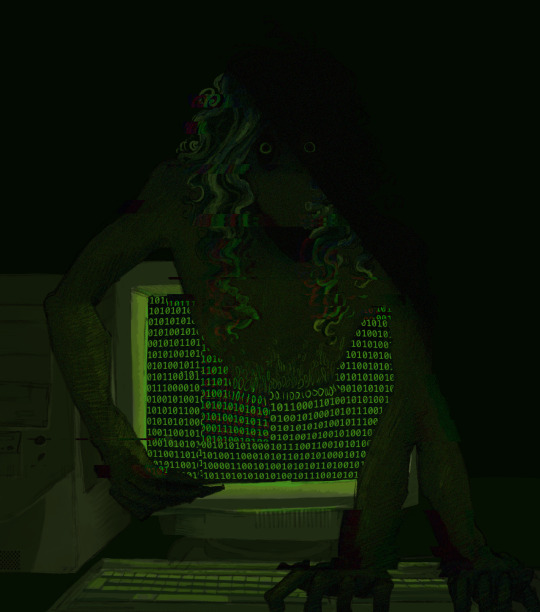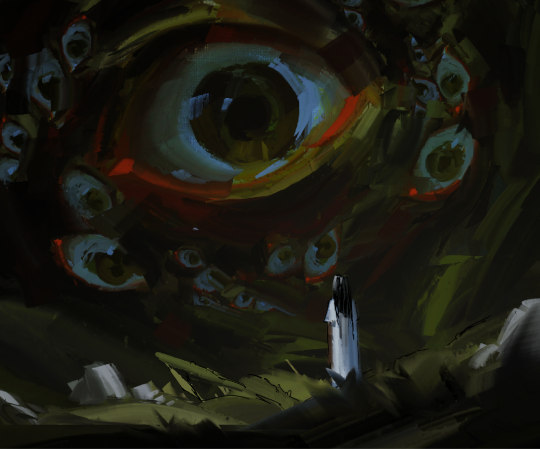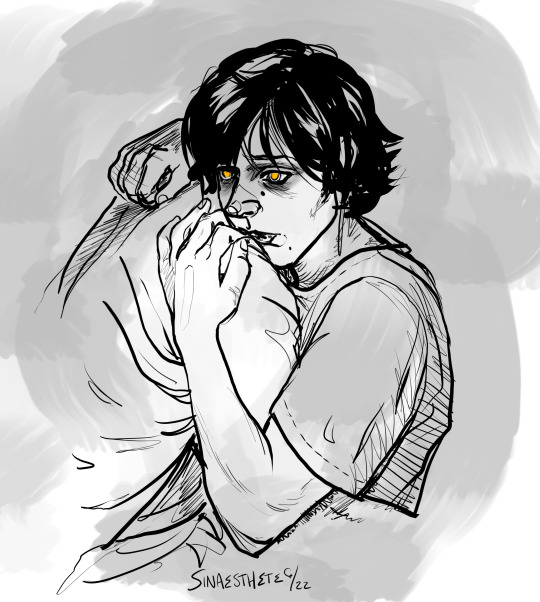Text
Just throwing this out there:
In Sam’s early life, before he read John’s journal, he was not protected from the hunting lifestyle.
He was dragged around the country. He was dumped in motels with Dean left to be his parent. He was taught to fight. He knew Dean could shoot a gun (though I’m not real sure when Sam learned). He saw his dad stagger in beaten and bloody.
Dean and Sam were “protected” from the hunting lifestyle in the same way - they didn’t go on hunts. That didn’t stop them from being targeted (striga), or from hunters coming after Sam (John’s journal is fringe canon, but from what I understand, a hunter saw him as fair game and accused him of ripping someone else apart; John recorded it all, and Sam read his father’s journal). They were kept away from the actual hunts - that doesn’t mean the lifestyle itself was in any way, shape, or form ‘good’ for them. Dean, at least, knew why. All Sam knew was that Dean and John were lying to him.
Sam was not protected the way everyone likes to claim. Sam was lied to, dragged around, and suffered from poverty, lack of an adequate caretaker, and gaslighting for the first eight years of his life.
And then you wonder why he has problems trusting people.
625 notes
·
View notes
Text
thinking about sam as a kid who was small and bullied and fought back against bigger children who used size to intimidate and harm. and sam as an adult who’s big and makes himself seem nonthreatening in his posture and stance. he rarely ever yells, he speaks gently, he rarely if ever touches women first. in fallen idols he sits beside the upset witness immediately to speak to her softly while dean stands over her. he puts himself on her eye level so he doesn’t look like a threat. growing up and gaining a physical power that was used against you as a small kid who was friends with the bullied. and choosing not to use it unless it’s to protect.
715 notes
·
View notes
Note
Hey I read through a bunch of your original posts and it is EXACTLY what I have been looking for!! My rewatch (if I ever get back to it lol) was supposed to be focused on seeing spn from Sam's POV and I think your blog gives me that much needed insight since a lot of people I follow are so boring about him lol. So hope you don't mind the follow!! I'm excited to see more 😊
Hi, thank you I'm glad you've found them interesting :) and you're more than welcome to hang out here.
2 notes
·
View notes
Text
Literally replace hunting with any other risky profession and the idea Sam is selfish for not wanting to hunt kind of collapses. No one would ever suggest someone who doesn't want follow the family tradition of joining the military is selfish because hypothetically, them joining could result in someone not dying. It's absurd.
Season 1 John and Dean are really like, you don't want to die painfully in your 20s/30s after a life of constant fighting with no outside connections? Is this? The height of selfishness?
260 notes
·
View notes
Text
I'm not sure I like the idea that Dean is eldest daughter coded actually.
I know it's not that serious, so excuse me reading so much into it. I even sort of understand where it comes from because Dean is intensely parentified. However, for me, a really important component of the 'eldest daughter' concept is the painful transition from child and daughter to just woman in the father's eyes. That inevitable point when the eldest daughter starts to be dismissed like all other women or starts to be intimidating when they question authority because it's an affront. If anything, I think that experience of dismissal out of the gate or being derided for asking questions is better reflected by Sam?
Idk I think Dean being a son is just really crucial to the dynamic he has with John. I know Dean doesn't really push back on his Dad, but John trusts him very deeply. A kind of trust, respect and mutual understanding that I just don't think would be the same if Dean was a daughter.
I'm really overthinking it but whats new?
#supernatural#spn#dean winchester#sam winchester#spn analysis#spn meta#john winchester#eldest daughter dean
54 notes
·
View notes
Text

Pov: you’re Sam
12K notes
·
View notes
Text

Beholding—
Jon is my comfort drawing :7
10K notes
·
View notes
Text
After posting about Dean's self-hatred and how it reaches the point of narcissism, it really hit me that Dean is such an INTERESTING character. I knew that obviously, but I feel like sometimes, the fandom really smooths over his edges and he sort of just flattens into this 'bad boy with a heart of gold', when he's so much more complicated than that.
He's deeply empathetic and dedicated to protecting people, but his morality is very black and white, making him brutal with non-humans sometimes. He deeply loves his family and will do anything to protect his brother, yet because of his myriad of issues, he treats Sam very poorly at times. He's good with kids, misogynistic, funny, quick to violence, self-loathing, and yet narcissistic. Overall, he's complicated.
I'm not super fandom active, so I hesitate to comment at all and know it's a sweeping generalisation. However, I do think this dichotomy occurs within the fandom, where Dean's worst traits are gentled and Sam's worst traits are exacerbated/his motives are always viewed in the worst light. This is annoying as a Sam fan as I feel it does a disservice to his character and what makes it interesting. But I'm realising it also does a massive disservice to Dean's character because he's a hero but he's also a fucking dick and that's WHY he's so interesting.
34 notes
·
View notes
Text
Genuine question here, because in a show with two brothers as leads, people are gonna pick favourites. To what extent is the pretty sizeable disparity in Dean's favour a consequence of the halo effect?
#personally I prefer Sam#but i dont hate dean by any means he's interesting and i see why he's popular#I'm just curious as to why it's not split more evenly (it feels like anyway)#sam winchester#supernatural#spn#dean winchester
5 notes
·
View notes
Text

And at last, the Archivist looks up.
24K notes
·
View notes
Text
It's been a while since I watched Supernatural, so don't take my opinions as gospel or anything. But I think Dean is self-hating to the point of narcissism in some ways. Don't get me wrong, I empathise with Dean and understand why fans largely do too. But his self-loathing warps his perception and becomes the centre of EVERYTHING and at times that really has ripple effects on those around him - particularly Sam.
Take their childhood, Sam has a right to mourn the fact that he didn't get a normal childhood. He's allowed to be angry that he didn't get a home, a present father, a stable community, and consistent education. But whenever Sam attempts to express his complicated feelings about his childhood, Dean immediately interprets it as ' oh I was supposed to look out for you. Are you saying I failed? Are you confirming I'm worthless?' which grinds the conversation to a complete halt. Because of Dean's intense self-criticism, Sam can never really be 100% honest with him or ask for support with his own issues, especially regarding their childhood. As anything outside of 100% gratitude just becomes another stick for Dean to beat himself with, and the conversation is immediately derailed.
Not only does Deans self-hatred mean that Sam's expression of his own experiences are pretty consistently shut down. In some ways, I think Dean strips Sam of his autonomy - he's so self-loathing, he sees every decision Sam makes as being about/a reaction to him. A good example of this is Stanford. Rather than understanding Stanford for what it was, an attempt by Sam to carve out a better life from himself and escape hunting. Dean views it as betrayal or abandonment, some re-affirmation of his own belief that he's not worth caring about. Rather than understanding it's a rejection of hunting, he sees it as Sam rejecting him. To Dean, Sam isn't attempting to find a better life, he's punishing the family.
Overall, it's interesting that people largely and rightfully sympathise with Dean due to his self-hatred. However, I don't see as much discussion about how his self-hatred doesn't just hurt him, it hurts those he's close to, as it colours his interpretation of their every action. Dean's self-loathing is always the biggest thing in the room and that has consequences.
616 notes
·
View notes
Photo

stargazing.
2K notes
·
View notes
Text
there is something particularly devastating to me that John, Bobby, and Mary all liked Dean better. like they all preferred his company over sams. something abt being the freak in the family.
35 notes
·
View notes
Text
Ripe by Sarah Rose Etter Review
Very mild spoilers maybe? - mostly just the synopsis and character names
Ripe introduces us to Cassie, a depressed, deeply disillusioned woman, working at a competitive Silicon Valley start-up. Trapped in an environment that encourages productivity to the point of self-destruction, Cassie struggles to cope with the long hours, unethical practices and exacting standards of her once dream job. Although isolated from her 'Believer' peers, who seem to swallow the company dogma easily, Cassie is never alone, as she is haunted by a black hole that no one else can see.
I adored this. Just to be clear, I don't think Ripe is going to be for everyone and I completely understand any dissenting opinions. This book is slow, meandering, heavy on the atmosphere and without any startling plot twists to keep you engaged if that's something you enjoy. Furthermore, our narrator Cassie is in a bad place here, her sardonic and frankly depressing musings reflect that. If that sounds unappealing, this probably isn't for you.
For me it was perfect. Etter manages to capture the cynical tone of someone disillusioned with life and late-stage capitalism in a way that is heartbreakingly relatable. It truly felt like she had read my most world-weary thoughts and put them on display for the world to see, making Ripe an incredibly cathartic read. Etter's descriptions are rich and visceral, with plenty of re-occurring themes to sink your teeth into. In particular, Cassie's narrative voice was reminiscent of Fight Club's Narrator, due to her cynicism and borderline violent imaginings when describing the Silicon Valley culture. As a fan of Palahniuk's most infamous novel, it was a joy to see.
I also have nothing but praise for the side characters that Etter presents us with. Some, like the CEO are delightfully satirical and two-dimensional (not even having names), which works wonderfully to emphasis Cassie's intense isolation as she navigates a world of zombie-like husks. Other characters like Cassie's Father, provide some really tender moments, granting much needed relief from the harsh world Cassie occupies. There are also characters such as Sasha, who occupy a sort of liminal space between caricature and real person. Initially appearing completely heartless, Etter lays enough groundwork to imply that Cassie's viewpoint of Sasha is unreliable - Sasha may have a vulnerable underbelly after all.
On the topic of Cassie's unreliability, the moments Etter reminds us that Cassie's perspective is fallible are among some of the strongest in the novel, inviting you to question how much Cassie's bleak outlook contributes to her poor mental state. Her material problems are undeniable and her disillusionment understandable. However, Cassie's skewed perspective often simply hinders her further and I appreciated the skill with which Etter revealed Cassie's biases while remaining tied to her point-of-view.
The unique structure of Ripe was lovely to absorb, keeping things fresh and entertaining from the first page to the last. In particular, the use of the definitions to start each chapter helped to keep the reader grounded as they traversed through a multitude of vignettes.
Finally, I thought the art included was lovely, particularly the recurring image of the black hole, which grows bigger with each recurrence. Overall, a fantastic read with excellent musings on capitalism, feminism and mental health.
#book tumblr#book review#ripe#sarah rose etter#book recs#booklr#reading#book recommendations#book recs 2023
1 note
·
View note
Text
I love how the Greek-Tragedy/Oedipus trope is used in Hill House. Liv, seeing a glimpse of the future, does everything in her power to prevent it from happening, which then ensures that it happens. Nell, seeing glimpses of her future self, is so scarred and traumatized that she walks the direct line to becoming bent-neck lady. I find the whispered “No-no-no-no-no” when she is hovering over her child-self so affecting and horrifying because what we’re seeing is her realization that this terrifying force, this horrible, life-ruining thing has always been herself. It’s delicious. If they’d both just known a leetle bit more…
There’s something about the idea of having supernatural knowledge of your own terrible fate being the impetus for cementing said fate that just gets me.
319 notes
·
View notes
Text
Madeline’s speech is 1000% how rich people think with the “um sweety don’t take our drugs if it’s so bad it’s the consumers fault you wanted us to make it we’re not the bad guys” when 1) the whole point is Fortunado is lying about its addictiveness and side effects and 2) we literally have Juno, the character in the story that has the record for taking the highest dosage of that drug ever, say she was given her high dosage while unconscious after an accident. She wasn’t given a choice at all. Like that speech wasn’t for us as the layman’s audience to say “wow we live in a society.” It was for us to see how far Madeline has deluded her self into feeling guilt free
3K notes
·
View notes
